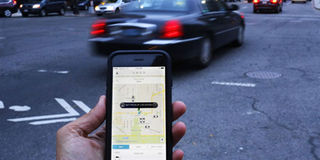Government asks Uber to audit its pricing model

Transport Principal Secretary Irungu Nyakera said on February 27, 32017 that the government has recommended a raft of bare minimum collaterals between Uber drivers and the owners
What you need to know:
- Since its launch in January 2015 in Nairobi, the company has faced several challenges and resistance from regular taxi operators.
- In June, 2016 the company slashed its prices by 35 percent in reaction to another competitor, Little Cabs.
The government has called on Uber to audit its pricing mechanisms in order to address any challenges posed by operating in a fluid environment where economic drivers change often.
This comes in the backdrop of a strike by drivers of the taxi-hailing app last week demanding higher rates citing low profits occasioned by the low prices being charged by the cab company in its cheap pricing model.
Transport Principal Secretary Irungu Nyakera, in a statement sent to newsrooms on Monday, said that they have recommended a raft of bare minimum collaterals to both parties, the drivers and the owners, to facilitate a return to normalcy within the shortest time possible.
“The government would like to assure all stakeholders, including the Uber customers that it has seriously considered their concerns and adequate measures will be mobilized to ensure an amicable solution and result is achieved,” said Mr Nyakera.
Mr Nyakera assured that Uber had extended goodwill that has seen the ministry reach the position it has taken.
“We also note the goodwill extended by Uber to arrive at this mutually beneficial position and hope that this goodwill is sustained in the ongoing deliberations,” he said.
The drivers have complained about the company’s service saying that it keeps 25 percent of what they bring in and this, according to them, was not fair.
Since its launch in January 2015 in Nairobi, the company has faced several challenges and resistance from regular taxi operators who have opposed its model of choice, cheap pricing, arguing that the model adopted by the company has taken away their business.
Early February this year, the regular taxi operators petitioned the San Francisco-based taxi operator to the National Assembly asking Members of Parliament to come up with ways of regulating fares in order to eliminate price manipulation which they said had been brought about by Uber.
In June, 2016 the company slashed its prices by 35 percent in reaction to another competitor, Little Cabs, which was introduced by Safaricom to offer similar services.




